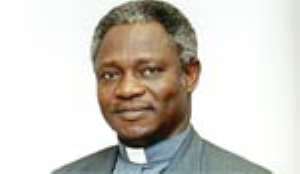
The controversial Pastoral Letter which rubbished the ongoing Educational Reforms in the country has finally seen government jumping into the fray with a call for a meeting between the feuding parties.
According to a correspondence signed by Ambassador D.K. Osei, Secretary to the President, government, in a spirit of accommodation and compromise wants the Anamuah Committee on Educational Reforms on one hand and the Ghana Education Service on the other to discuss and address the thorny issue of Religious and Moral Education in the country's schools.
This would enrich the ongoing Reforms to the benefit of the entire nation, according to the correspondence.
President John Agyekum Kufuor has in this direction asked the Minister of Education to initiate and oversee the necessary meetings.
The release adds that while fully committed to the New Educational Reform Policy launched last September, “it is not in principle against having Religious and Moral Education as a key subject on the School Curriculum.”
Government intervention in the subject stems from the raging debate prompted by a Pastoral Letter published by the Catholic Bishops Conference at the end of its Plenary Session in Kumasi on 9th November, 2007 and endorsed by the Christian Council of Ghana.
The Catholic Bishops had in a press statement signed on their behalf by the Most Rev. Lucas Abadamloora, Bishop of Navrongo, and sent to selected media houses, expressed disappointment that educational reforms since independence had edged out religion from education.
“What is even more worrying, embarrassing and unacceptable is that the ongoing educational reforms which should have learnt from past mistakes have aggravated the already deplorable situation by removing religious and moral education from the time-table, and condemned it as a mere concept, and even then treated as appendices to other subjects,” they said.
They demanded an immediate inclusion of Religious and Moral Education in the syllabus as a subject on its own and given all the attention it deserves.
Sidelining religion and morality from education, according to the clergymen, is tantamount to making it impossible for the human person to develop himself or herself to be a full human being in the society.
Touching on the advantages of imparting religious principles in schools, which they said was unequalled, the clergymen noted “it can help negate the culture of vice and iniquity into which our society is being plunged deeper and deeper, even in the fiftieth anniversary of our independence.”
In a robust and categorical language, they said “it is religion that sets for society rules of love, rules of mercy, rules of forgiveness, rules of justice, rules of patience and tolerance and hard work.”
Speaking, as they put it, on behalf of Ghanaian parents and of all Ghanaians, they said they had no choice but to clearly reject certain positions in the past and present educational policies.
These, they pointed out, included what they describe as the gradual and systematic exclusion of the teaching of religion and morality from schools.
Now that government has stepped in, perhaps an end is in sight on this thorny subject which has put the two parties on parallel paths.
By A.R. Gomda




 2024 elections: Resign if you can't be faithful to party - Sagnarigu NDC PC desc...
2024 elections: Resign if you can't be faithful to party - Sagnarigu NDC PC desc...
 Five arrested, remanded over alleged murder of two police officers at Transacco
Five arrested, remanded over alleged murder of two police officers at Transacco
 Tax exemptions better than incentives for churches – Tax Analyst tell Bawumia
Tax exemptions better than incentives for churches – Tax Analyst tell Bawumia
 Transport Minister sues Law Platform Editor for defamation
Transport Minister sues Law Platform Editor for defamation
 Voter registration: Police arrest NPP Treasurer for Mpohor for registering minor
Voter registration: Police arrest NPP Treasurer for Mpohor for registering minor
 "This nonsense must stop" — Lawrence Tetteh vows to march to Jubilee House over ...
"This nonsense must stop" — Lawrence Tetteh vows to march to Jubilee House over ...
 2024 elections: “If indeed you stand for peaceful elections the time is now for ...
2024 elections: “If indeed you stand for peaceful elections the time is now for ...
 I have the attributes to be president of this country — Bernard Monarh
I have the attributes to be president of this country — Bernard Monarh
 Cecilia Dapaah saga: ‘Turf war’ between AG, EOCO, OSP indicates they’re not ‘cor...
Cecilia Dapaah saga: ‘Turf war’ between AG, EOCO, OSP indicates they’re not ‘cor...
 Ghana will become the first African country to embrace blockchain-powered gover...
Ghana will become the first African country to embrace blockchain-powered gover...
